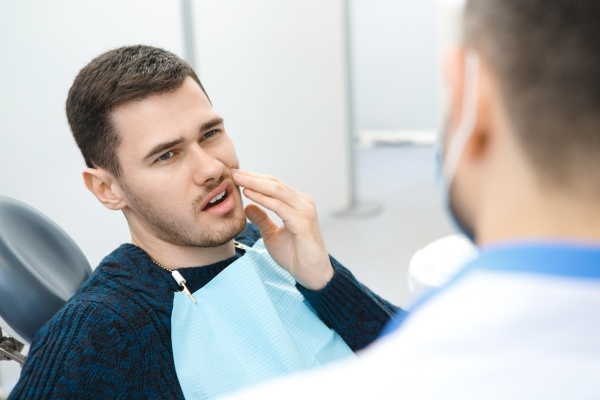What is the Difference Between TMJ and Bruxism?

Patients often confuse TMJ and bruxism, or teeth grinding, with each other. Both are distinct conditions that may actually be related, and both are the cause of discomfort and potentially serious oral health complications.
Understanding bruxism
Bruxism is sometimes simply referred to as teeth grinding and typically happens during sleep, but it may occur at any time. Symptoms may include abnormally worn or chipped teeth, sensitivity due to enamel erosion and a sensation of tension or pain in the jaw and ear region.
Bruxism has a number of potential causes, although the most common is daytime stress and anxiety. This tension accumulates during the day and is released in the form of teeth grinding. However, it may also be caused by misaligned teeth.
Treatment for bruxism
Once a patient is determined to be suffering from bruxism, a number of treatments may be recommended. The most common is the use of a nightguard. These are comfortable, clear devices fitted to a patient’s front teeth to prevent grinding. It is possible to purchase nightguards in retail outlets, but a dentist can ensure a custom fit for improved results.
There are other potential treatments that may be prescribed along with a nightguard, including stress management, lifestyle changes such as limiting alcohol and caffeine or even prescription medication. However, the use of a nightguard is the most common method used to instantly prevent further damage from teeth grinding.
Understanding TMJ
TMJ is short for temporomandibular joint, but in dentistry, TMJ refers to disorders of this joint. It may also be referred to as TMD, or temporomandibular disorder.
Regardless of the name, it is a serious and painful condition characterized by a range of symptoms. Sufferers may experience pain in the face, jaw and ear region or even the neck and shoulders. It may be difficult to open the mouth widely, and the jaw may lock when doing so. Additional symptoms may include clicking sounds when the jaw is moving, swelling, difficulty chewing, tooth and ear aches or hearing problems.
These are serious symptoms that should immediately be checked out by a dentist. Unfortunately, without a dentist’s help, it can be difficult to determine why these symptoms manifest, as TMJ can occur for many reasons. Common ones include bruxism, arthritis, stress or structural problems with the joint. The connection between bruxism and the potential development of TMJ is why the two conditions are often confused.
Treatment for TMJ
If a patient is suffering from TMJ, a dentist will assess the severity of the problem and recommend proper treatment. Treatments may include medications, therapies or surgery.
Medications for TMJ
While pain relievers and anti-inflammatory medications are most common, muscle relaxants may also be used if bruxism is the underlying cause. Tricyclic antidepressants in low doses may also aid in the cessation of grinding.
Therapies for TMJ
Mouthguards are useful if the underlying cause is bruxism, although patients without bruxism may also experience success when using mouthguards. Physical therapy can help strengthen jaw muscles. Counseling may also be suggested to minimize behavioral antagonists of the condition.
Surgeries for TMJ
Surgical intervention is typically only necessary if other methods do not work. Corticosteroid or Botox injections often relieve pain. A procedure called arthrocentesis can help irrigate fluids responsible for inflammation. Surgery on the joint itself is much less common and only occurs as a last resort.
Conclusion
TMJ and bruxism are both serious disorders that may lead to severe oral health problems. Though they may be interrelated, each is distinct, and the only way for a patient to determine whether symptoms are an indication of either condition is by consulting a dentist. To learn more or to schedule an appointment, call our office today.
Request an appointment here: https://www.sacramentosleepdentist.com or call Dental Excellence of Greenhaven at (916) 293-0504 for an appointment in our Sacramento office.
Check out what others are saying about our dental services on Google: TMJ Dentist.
Recent Posts
An assessment for dental veneers can tell your dentist if you need these restorations. Veneers are customizable and thin. Each shell can correct mild to moderate dental issues. Here are the details to know when your dentist may suggest dental veneers.Even if other dental restorations can repair these mild types of damage, dental veneers are…
A growing number of people are turning to clear aligners to fix crooked teeth without the look and feel of metal braces. These smooth, nearly invisible trays fit over teeth and gently shift them into place. They are popular with both teens and adults who want a better smile. Clear aligners can help create healthy,…
Dental veneers are ideal for fixing your tired smile. These shells can improve the appearance and structure of your teeth. But these restorations are not for everyone. The following factors indicate that dental veneers are ideal for you.Broken, cracked, or chipped teeth will need immediate restoration. Any degree of dental damage will leave the teeth…
Dental veneers are versatile restorations. Your dentist can improve the health and appearance of your teeth by applying these custom-fit shells. Talking to your dentist about the procedure can motivate you to set your treatment schedule. Here are the pros and cons of getting your dental veneers.Dental veneers can be a good choice for dental…


